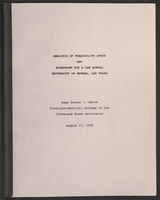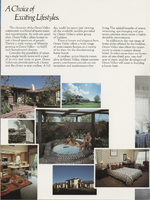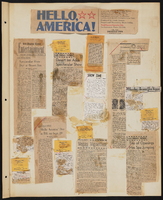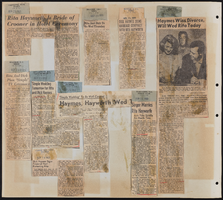Search the Special Collections and Archives Portal
Search Results
Hazel Baker Denton Photograph Collection
Identifier
Abstract
The Hazel Baker Denton Photograph Collection (1910-1961) is comprised of photographic prints and one negative of the Denton family and friends, primarily taken in Nevada and Utah. Many photographs depict life in small Nevada towns, particularly Caliente. Photographs also depict Utah, Oregon, Washington D.C., and California, and unidentified desert and forest landscapes throughout the American West.
Archival Collection
Richard Bryan oral history interviews
Identifier
Abstract
Oral history interviews with Richard Bryan conducted by Kristin Guthre on November 10, 2011 and an unknown date for the Boyer Early Las Vegas Oral History Project. Bryan begins by discussing his father’s time as a law student in Washington, D.C. and the influence his father had on his decision to pursue law. Bryan then chronicles moving to Las Vegas, Nevada in the 1940s and growing up in the Huntridge Community near Charleston Boulevard. Bryan recounts attending both the University of Nevada, Reno and the University of California, Hastings College of the Law in San Francisco, California. Bryan describes his experiences in the Las Vegas District Attorney’s office and the Army Reserve. He then recalls his political career as a member of the Nevada Senate, his role as the Attorney General of Nevada, the Governor of Nevada, and as a United States Senator. Lastly, Bryan discusses political issues in Nevada and the United States during his time in office such as debates about renewable energy, environmentalism, and preservation.
Archival Collection
Flora and Stuart Mason oral history interview
Identifier
Abstract
Oral history interview with Flora and Stuart Mason conducted by David G. Schwartz on February 27, 2010 for the Remembering Jay Sarno Oral History Project. Flora Mason begins by discussing the relationship between her family and the Sarnos. Mason describes that she and her husband socialized with Jay and Joyce Sarno in the 1960s because they lived on the same street in Las Vegas, Nevada. Stuart Mason recounts how the Sarnos were incredibly friendly and Jay occasionally invited him to play golf. Mason then chronicles his role as a contractor and the work he did for Jay Sarno throughout his career. He talks about how many of the development ventures of Sarno's were funded by Jimmy Hoffa and the Teamster’s Union. Lastly, Mason discusses how Sarno understood the gaming industry more than any other casino operator and how that was attributed to the success of Caesars Palace.
Archival Collection
Frank Scott Papers
Identifier
Abstract
The Frank Scott Papers date from 1940 to 1984 and contain promotional materials, photographs, and menus from the Union Plaza Hotel; University of Nevada, Las Vegas (UNLV) basketball memorabilia; and KRLR TV documentation, correspondence, and news clippings. The collection also contains a scrapbook and photographs of the re-opening of the Mizpah Hotel in Tonopah, Nevada.
Archival Collection

Interview with Marie Elizabeth (Stever; Daly) McMillan, March 5, 2004
Date
Archival Collection
Description
Text

University of Nevada, Las Vegas law school feasibility studies
Date
Archival Collection
Description
Folder contains a study titled "Analysis of Feasibility Study and Blueprint for a Law School, University of Nevada, Las Vegas" by Steven R. Smith, Cleveland-Marshall College of Law, Cleveland State University, August 17,1990 and a second study titled "A Feasibility Study for a Law School at the University of Nevada, Las Vegas" prepared by R. Keith Schwer, PhD, Director, The Center for Business and Economic Research, University of Nevada, Las Vegas, May 29, 1996. From the University of Nevada, Las Vegas William S. Boyd School of Law Records (UA-00048).
Text

Casiano Corpus Jr. oral history interview: transcript
Date
Archival Collection
Description
Oral history interview with Casiano Corpus Jr. conducted by Cecilia Winchell and Stefani Evans on February 14, 2023 for the Reflections: the Las Vegas Asian American and Pacific Islander Oral History Project. In this interview, Corpus Jr. details a difficult childhood in the Philippines, where society is highly socioeconomically stratified. He recalls his parents working a number of jobs to support their large family, and as soon as he finished his primary schooling, he also started working in construction. When his father was finally petitioned by his uncle to move to the United States, Corpus was at first reluctant to go, since he had a familiar life in the Philippines, but has come to love the United States and the life he created for himself. Immediately after moving to the United States, their family landed in Las Vegas, Nevada, and Corpus began working a number of jobs. He started out as a busboy at a Chinese restaurant before deciding that he wanted to work in a casino and moved to Union Plaza. His current job is as a porter at Palace Station, where he has been for the past 31 years. He has also been working to unionize Palace Station and Station casinos with the Culinary Union for the past twelve years. He talks about the hunger strike he organized, why he organizes with no fear, and what he hopes to see out of his efforts throughout the interview.
Text



